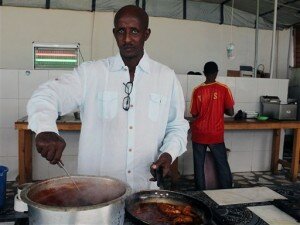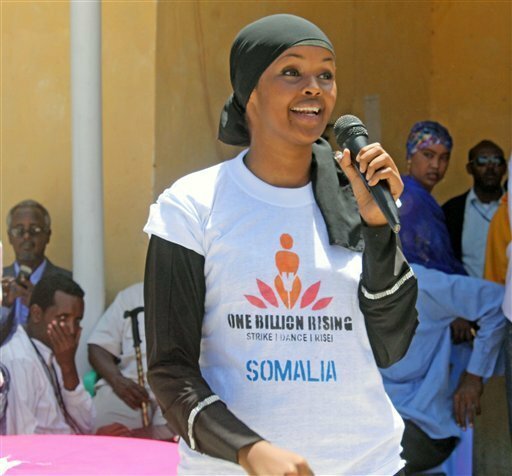Mogadishu TEDx talk challenged by security threats
(AP) MOGADISHU, SOMALIA — The short talks by artists and intellectuals at events known as TEDx have been held 7,500 times in more than 150 countries, but there may not be an event more challenging or dangerous as the TEDx talk being held in Mogadishu this Saturday.
Then again, there may be no city in the world that needs its smartest and strongest voices heard as much as Somalia’s capital, which is clawing its way forward to move beyond its bombs-and-bullets past.
Baghdad and post-conflict Tripoli, Libya have each hosted recent TEDx talks. But Mogadishu is probably the most challenging place for the talks, according to Nate Mook, the co-organizer of Saturday’s event.
Originally the second TEDx talk in Mogadishu was to be held in June. But that month al-Shabab rebels attacked a United Nations office center, killing eight U.N. employees and five Somali civilians, so the event was rescheduled.
TED’s theme is “Ideas Worth Spreading.” The main yearly TED event attracts high-power names like Bill Clinton and Bill Gates. TEDx events are smaller, community-based events held around the world to showcase local ideas and talent.
Saturday’s lineup will showcase Somalia’s budding stars. Iman Elman is a 21-year-old commander in Somalia’s military in charge of a battalion of nearly 100 men. Mohamed Mahamoud Sheik, a 25-year-old entrepreneur, noticed in 2012 that Somali men were hand-carrying their suits on flights from Mogadishu to Nairobi. Why? Somali’s capital had no dry-cleaning services, so he started one.
Security will be “the No. 1 priority of the day,” Mook said. Audience members at Saturday’s talk will pass through security checkpoints and be individually searched, and they may not even know yet where it will take place.

In this photo taken Wednesday, Aug, 28, 2013. Ahmed Jama a British Somali chef and one of last year’s TEDx Mogadishu speakers, cooking food at his hotel in Mogadishu, Somalia. Ahmed spoke last year and will speak again this year. He said last year’s talk “connected me to the world.” The talk won him an invitation to a cooking event in Denmark. The short talks by artists and intellectuals at events known as TEDx have been held 7,500 times in more than 150 countries, but there may not be an event more challenging or dangerous as the TEDx talk being held in Mogadishu this Saturday. Then again, there may be no city in the world that needs its smartest and strongest voices heard as much as Somalia’s capital, which is clawing its way forward to move beyond its bombs-and-bullets past. FARAH ABDI WARSAMEH — AP Photo
“We don’t announce where the event is taking place. We are very particular about the invitations that we give out,” said Mook, a 31-year-old from Washington, D.C.
Arranging Internet access to beam the English and Somali language talks to the world has been a big challenge. But Mook helped with Mogadishu’s first TEDx talks last year, and says he is much more excited about this year’s event.
“The amount of interest and support for Somalis all over the world to hear about these positive stories has been immense. In many ways TEDx provided, it opened a door to a place that was inaccessible for a really, really long time,” Mook said.
Somalia fell into anarchy in 1991 when warlords ousted the president. Al-Qaida-linked Islamic extremists from the group al-Shabab controlled the capital from 2006 until they were pushed out by African Union and Somali forces in 2011. That military success heralded a blossoming of the sports, business and arts scene in Mogadishu, although deadly al-Shabab attacks still take place.
Ahmed Jama, a British-Somali chef, spoke last year and will speak again this year. He said last year’s talk “connected me to the world.” The talk won him an invitation to a cooking event in Denmark.
“Despite challenges, it’s a sign of peace and inspiration. It’s helping Mogadishu to show its positive side of life and development. They bring in prominent and inspiring speakers who draw positive attention to Mogadishu,” Jama said.
Ilwad Elman, who helps run the Elman Peace and Human Rights Center in Mogadishu, spoke at last year’s TEDx event and is a co-organizer this year. Her goal is to cultivate and celebrate social entrepreneurship in Mogadishu by allowing the country’s leading thinkers to reach a wider audience. She said last year’s event inspired Somalis to return to Mogadishu to open businesses.
“Despite the known risks associated with organizing a globally live-streamed event of this caliber,” said Elman, “I believe it’s most worth it because of the real potential that our viewers will act on the ideas shared with them this year, just as they did last year, and ultimately contribute to eradicating current risks we face in organizing this event.”
—
Straziuso reported from Nairobi, Kenya.
Comments
comments
 Calendar
Calendar







































